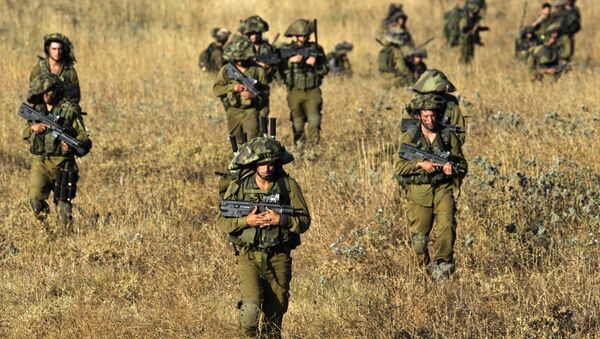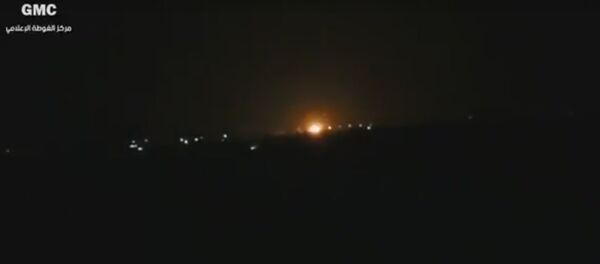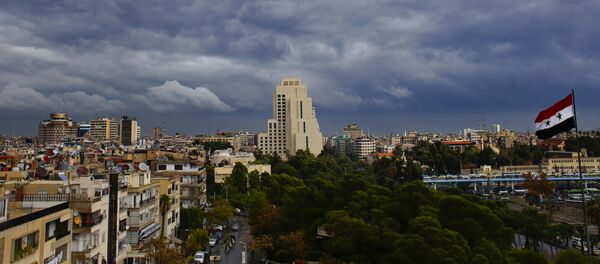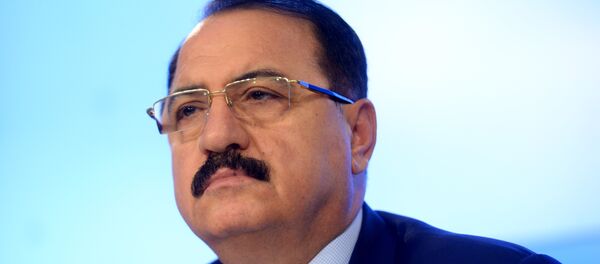On Thursday, a large explosion occurred close to the Damascus airport, with initial reports claiming that it was an Israeli attack on a supposed Hezbollah supply hub.
Following the incident, Israel's Minister of Transportation and the Minister of Intelligence Yisrael Katz made an interesting comment, saying that the strike "is in line with Israel's policy of countering Iranian attempts to supply modern weapons to Hezbollah through Syria," but stopped short of saying Israel was responsible for the strikes.
Katz also cited Israeli Prime Minister Benjamin Netanyahu's pledge to continue Israeli efforts to prevent the alleged delivery of weapons from Iran to Hezbollah, which is fighting on the side of the Syrian government forces.
For its part, the Israel Defense Forces (IDF) press office also refrained from commenting on the matter.
Russian online newspaper Vzglyad, however, got in touch with Elina Bardach-Yalova, Press Secretary of the Ministry of Defense of Israel, who provided at least some commentary.
"Yisrael Katz has made a somewhat ambiguous remark. I don't think he suggested that it would be perceived as confirmation," she told the outlet.
Speaking with Russian Defense Minister Sergey Shoygu and Foreign Minister Sergey Lavrov, Liberman expressed Israel’s concern that Iran is allegedly using Syrian territory to smuggle arms to the Lebanese group, which is viewed by Tel Aviv as a terrorist organization, something Israel has said it cannot condone.
"In this particular case, Israel is interested in Hezbollah only because this group is being supplied from Syria, with the help of Iran, with high-precision missiles which can pose a threat to the residents of Israel," Bardach-Yalova told the website.
"These are long-range missiles and Israel has every intention to prevent the supply of these missiles to Hezbollah. Such handovers often take place on Syrian soil and in cases where it is impossible to prevent it by any other means, we have to destroy these deliveries," she added.
"Any missiles possessed either by Hezbollah or Hamas pose a threat, as do any missiles if they are going to be launched at someone's territory. It will inflict damage. And we want to prevent it," she said.
Bardach-Yalova stressed that Israel is not interested in interfering into what she called an internal Syrian conflict. However, she noted the warning of the country's Defense Minister, who sad that Israel will only interfere into what is going on in Syria when arms are supplied to Hezbollah.
Commenting on another of Liberman's warnings, that Israel "won’t allow concentrations of Iranian and Hezbollah forces on the Golan Heights," Yevgeny Satanovsky, head of the Moscow-based Middle East Institute think tank talked about the interests of Iran and Hezbollah in the area.
"Iran might be interested in the concentration of forces against Israel. Hezbollah, however, can’t do anything. It might not want to get into a confrontation with Israel as it has another enemy to fight against, judging by the fighting and its victims in Syria. But it is a clear [Iranian] satellite," he told Vzglyad.
"Israel won't allow Iranians to launch any serious attack on its territory," he concluded.
In a separate comment on the issue, Anton Mardasov, a military expert and head of the Department of Middle East Conflicts at the Institute for Innovative Development, a Moscow-based think tank, said that the Iranian presence in Syria is not limited to the army units, the units of the Islamic Revolutionary Guard Corps and Lebanese Hezbollah.
Over the course of Iran's interference in the Syrian conflict, he said, many international brigades, which could be called Shi'ite jihadists, have come to Syria from Afghanistan and Pakistan. The Iraqi Hezbollah, an affiliate of the Syrian Hezbollah, is also present in the country. Many of these pro-Iranian proxies are deeply rooted there, including in the territories near the Golan Heights.
Moreover, the expert said, some of the groups, such as the Iraqi units, are part of the al-Hashd al-Sha'abi (People’s Mobilization Forces), an Iraqi state-sponsored umbrella organization, which have recently declared a jihad against Israel.
However, regardless of the extensive presence of Iranian proxies in Syria, there are no prerequisites that they will start fighting against Israel, he said. Iran is already incurring considerable expenses for its involvement in the Syrian conflict.
Meanwhile, the expert said, Damascus is being called "the Iranian gates." It is quite hard to control all Iranian supplies to the country. Iranian aircraft fly into Syria very often and it still remains a question of what they are delivering there. There is a certain risk that Iran is strengthening its positions in Lebanon and Syria by delivering armaments, and Israel is concerned about it, he said.
Mardasov also noted that, on the other hand, it was repeatedly admitted that not only the so-called "moderate opposition," such as the Free Syrian Army, is undergoing treatment in Israeli hospitals. There are also the fighters of the units which have sworn allegiance to the terrorist group Daesh (ISIS), as well as al-Nusra fighters.
"It is in Israel's interests to weaken its unfriendly neighbors and to demonstrate that it is able to make an agreement with numerous players," he said.
Israel may also have a certain influence on the opposition and act as a guarantor of a ceasefire, the expert concluded.








